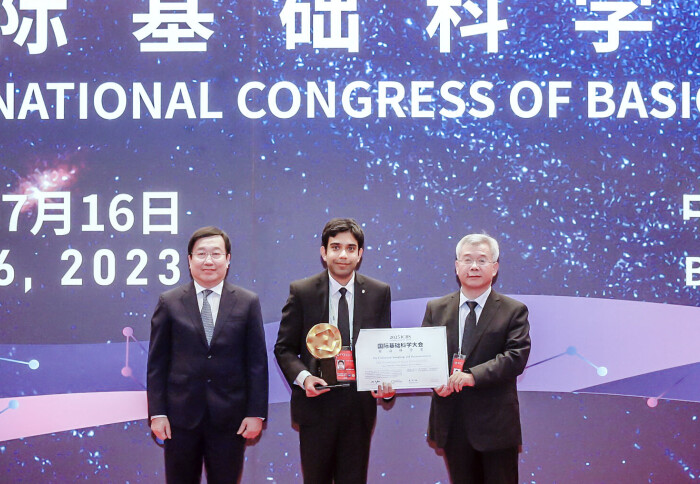Dr Ayush Bhandari receives Frontiers of Science Award
by Jane Horrell

The award was presented at the opening ceremony at the Great Hall of People on 16 July
Congratulations to Dr Ayush Bhandari, who received the Frontiers of Science Award at the inaugural International Congress of Basic Science in Beijing.
The Congress, chaired by Fields Medalist Shing-Tung Yau, brought together leading scientists including Fields Medalists, Turing Awardees, and a Nobel Prize laureate from around the world to promote collaboration and knowledge exchange, focusing on three branches of basic science: mathematics, theoretical physics, and theoretical computer and information sciences.
“The ICBS Frontiers of Science Award recognises Dr Bhandari’s significant contributions to the advancement of information sciences, and showcases his recognition as one of the world-leading researchers in this field.” Professor Kin K Leung Head of Communications and Signal Processing Group, Imperial College London
Frontiers of Science
The Frontiers of Science Award honours ‘top research, with an emphasis on achievements from the past five years which are both excellent and of outstanding scholarly value’ in both basic and applied research across 34 categories.
The aim is ‘to encourage young scholars to look to the frontiers of basic science, set goals to obtain breakthrough results as early as possible, and contribute wisdom and energy to humankind’s study of the mysteries of the natural world.’
Unlimited Sensing
Dr Bhandari received this award for pioneering contributions to Unlimited Sensing — a new digital data acquisition protocol he developed towards the end of his doctorate at MIT which allows sensors to process a greater range of information.
Since joining Imperial in 2018, he has been working on both the theoretical and hardware aspects of this digital sensing pipeline, together with his group members and collaborators. This award was based on his 2020 paper published in the IEEE Transactions on Signal Processing together with Felix Krahmer (TU Munich) and Ramesh Raskar (MIT).
How can we use Unlimited Sensing in the future?
The technique could unleash the potential for improved range, precision and sensitivity in devices including mobile phone cameras, radar systems, medical imaging and time-of-flight cameras.”
Ayush explains: “Conventional digital acquisition—the workhorse of all modern signal processing systems—is based on Shannon’s principle where the input signal is quantized to digital bits, thus setting a trade-off between dynamic range and digital resolution.”
“By introducing folding non-linearities in the sensing pipeline, essentially by ‘folding’ large signals into smaller digital signals that can be read by existing sensors, the Unlimited Sensing Framework simultaneously offers high dynamic range reconstruction with higher digital resolution, thus opening the pathways to new capabilities.
Demonstration of the 'folding' signal:
Congratulating Ayush on this award, Professor Mário Figueiredo, Head of the Information and Data Science thematic line of Instituto Superior Técnico, University of Lisbon, said: “The framework proposed by Dr Bhandari is a groundbreaking combination of theoretical depth and practical relevance, offering an innovative solution to a long-standing limitation of analog-to-digital conversion (ADC). Given the pivotal role that ADC plays in interfacing the physical and digital worlds, the proposed framework promises a significant impact in the many areas involving data acquisition, namely communications, imaging (including medical), and myriad other signal processing applications. It is truly worthy of this award."
Professor Geert Leus, of the Faculty of Electrical Engineering, Mathematics and Computer Science, TU Delft also commented: "The concept of unlimited sampling is appealing from a practical perspective since it introduces a novel type of analog-to-digital converters without saturation effects. It also opens up a whole new range of theoretical problems in the field of information theory and signal processing, e.g., rate-distortion analysis and perfect reconstruction, inspiring many researchers all over the world to step into this field."
For his contributions in computational sensing and imaging, Dr Bhandari has also previously received the 2019 UKRI Future Leaders Fellowship, the 2020 Best PhD Dissertation Award (IEEE Signal Processing Society) and the 2021 President's Medal for Outstanding Early Career Researcher at Imperial College London.
Dr Bhandari and co-authors have recently written an open-access, primer book on the emerging field of Computational Imaging (MIT Press).
Article text (excluding photos or graphics) © Imperial College London.
Photos and graphics subject to third party copyright used with permission or © Imperial College London.
Reporter
Jane Horrell
Department of Electrical and Electronic Engineering
